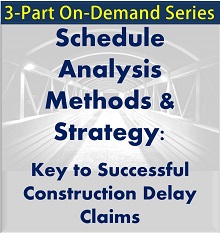| Expert Presenters |  Patrick Kelly Navigant Consulting, Inc. Mr. Kelly is an Associate Director in the Global Construction Practice. He provides services in construction management, contracting, project controls, scheduling, earned value analysis, forensic schedule analysis for delay and disruption, and claims & disputes resolution. Complete bio. | .JPG) John Livengood Navigant Consulting, Inc. Mr. Livengood is a managing director in the Global Construction Practice of Navigant Consulting, Inc. John has more than 37 years of experience in construction, design, delay analysis and litigation support. Complete bio. |  James G. Zack Navigant Consulting, Inc. Mr. Zack is Executive Director, Navigant Construction Forum™ – the construction industry’s global resource for thought leadership and best practices on avoidance and resolution of construction project disputes globally. Complete bio. |
|
Part I. Schedule Delay Analysis: Choosing a Method Presented by Jim Zack, Navigant There have always been debates and arguments over which delay analysis method is "the best method" to be used. Hundreds of articles have been published going back to the late 1960's. Which method is best is still a wide-open issue among schedulers, claim consultants, construction managers, contractors and attorneys. The level of debate has increased in recent years since AACE International published their Recommended Practice — Forensic Schedule Analysis. What has not been widely discussed or written about is what factors should go into the decision-making process when choosing a delay analysis method for a particular project or a specific claim. Listen to this 90-minute program to get answers to pressing questions, such as: - How do you go about choosing a delay analysis method?
- What factors and issues should be addressed before committing to a potentially lengthy and expensive process?
- Is the choice of delay analysis method irrevocable once made?
- What is the risk of trying to change methods in mid-stream?
Our expert instructor, Jim Zack, will provide answers and insights to these issues and highlight the 11 factors the scheduler should at least consider when making a choice. Generally good explanations of the various salient points that must be considered, prior to moving to the proper schedule delay methodology. Drew Ray
Hill International | Fast pace seminar good information. Anonymous Participant | I felt good about the overall delivery of the webinar and expertise of the speaker. John Clark
MWH Global |
Part II. Forensic Schedule Analysis and Discretionary Logic Presented by John Livengood, Navigant Let's face it: Forensic Schedule Analysis (FSA) and real-time schedule review do not handle CPM schedules with significant amounts of discretionary logic very well. Major theoretical and practical advancements have been made on what FSA methodology is most appropriate to evaluate schedule delay in the last decade, largely through the introduction of AACE's RP29R-03. Nevertheless, discretionary logic - the type of logic that is not dictated by either the contract or the physical necessity of the project - continues to cause difficulty for fair and accurate analysis of schedule updates during the course of the project in the construction industry. Further, these analytical problems persist in the methodologies associated with post-construction FSA. This program will help you: - Understand contractual, mandatory and discretionary logic
- Discover the basics of four major FSA methodologies
- Become familiar with the role of contemporaneous updates
- Identify out-of-sequence work
- Learn how each FSA methodology addresses out-of-sequence work
Very informative. Anonymous Participant | The speaker was well versed in what works and what doesn't work for forensic scheduling, something that you learn by hands on experience. I appreciate listening to a lessons learned talk. Anonymous Participant |
Part III. Forensic Schedule Analysis on Risk-Adjusted Schedules Presented by John Livengood and Patrick Kelly, Navigant It is likely that risk-adjusted schedules will expand beyond their current uses and become more common in buildings and infrastructure construction, as time and cost pressure from owners increases. As this happens, what will be the impact on Forensic Schedule Analysis (FSA), as more risk-adjusted schedules form the basis of delay claims? Risk-adjusted CPM schedules use computer modeling to analyze the likely fluctuation of activity durations resulting from a range of uncertainties and risks, and then analyze the effects of the variations on the schedules float as different chains of activities are given different durations and the amount of float changes. The result is a schedule that has a series of potential critical paths with varying degrees of likelihood, rather than a single Critical Path and sub-critical paths. FSA, however, is predicated on identifying the "single" contemporaneous critical path, often defined as the path with zero float. So what happens when the CPM schedule series has been risk-adjusted so that float is variable and more activities paths are critical? You will leave this informative program with a better understanding of: - Basics of risk theory
- Monte Carlo analysis and CPMs
- What FSA methodologies work best on risk-adjusted schedules
- And much, much more!
Listen to our two scheduling experts to learn more about the fascinating topic of risk-adjusted schedules for both improved project management as well as potential delay analysis applications.
|



.JPG)
